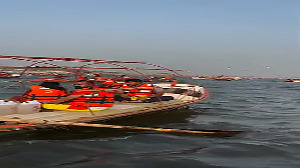THE National Security Advisory Board, India's top panel of national security experts, has asked the government to review its no-first-use of nuclear weapons policy in light of the history of the last four years.'
In an exclusive report published in India Abroad, the weekly newspaper owned by rediff.com, the third Board's final report recommended, 'India may consider withdrawing from this commitment as the other nuclear weapons state have not accepted this policy.'
The third NSAB submitted its final report, the National Security Review, to National Security Advisor Brajesh Mishra December 20 in New Delhi. Former ambassador to China C V Ranganathan, convener of the 15-member board, presented the report that takes a deep look at India's internal and external security aspects, and recommends short- and long-term measures to strengthen India's security.
The first National Security Advisory Board two years ago had supported the government's stand that India would never be the first to use nuclear weapons. But the latest report wanted this policy overturned, pointing out that India is the only nuclear weapon state that has committed itself to a no-first-use' policy.
The United States had at no stage agreed to such policy and Russia abandoned the posture, which had been adopted by the Soviet Union. Though China has asserted it would not be first to use nuclear weapons, in recent years there has been some confusion on their stand, especially vis-à-vis Taiwan.
Among its other recommendations, the Board has asked government to finalize and publicly declare the setting up of a command and control structure for the country's nuclear weapons. It has suggested that New Delhi develop responses to (threats of nuclear attack) to the maximum extent possible.
The Board asserted that should the United States ever resume nuclear weapons testing, India should feel relieved from its commitment on not conducting any more tests and conduct further tests.
It discussed the US Nuclear Posture Review, which had listed nuclear and even non-nuclear countries that can be targeted with small nuclear weapons. The Board warned that India should worry about the possible chaotic situation if Pakistan or China were to follow the US policy of targeting non-nuclear states.
It suggested setting up a Department of Counter-Terrorism within the home ministry to fight terrorism. As an interim measure, it has suggested the creation of a Counter-Terrorism Task Force to spearhead the drive against terrorism and suggest suitable tactics.
The 160-page report is the result of many rounds of deliberations among the country's top security experts over the past year. Surprisingly, there were no high-level meetings to deliberate on Kashmir or any serious debate on the implications of 9/11 on India's security. By and large, the report has few original or bold suggestions and has tended to recycle conventional wisdom and mouth platitudes.
The section on the threat to economic security reads more like a report by the Planning Commission than a report by professional national security experts. Little attention has been paid to likely threats to the country's information infrastructure from adversary states and terrorists.
On the positive side, the report has produced a fairly extensive study of the different aspects of national security, especially the developments in Pakistan and their implications for India's security, and has also incisively highlighted the threats to India's internal security.
Pakistan and Terrorism
The Board it believes the Pakistan army will remain the main power center, whether or not General Pervez Musharraf stays at the country and the army's helm, and that the army would continue to control the jihadis [Islamic fundamentalists].
The experts said the US army's presence in Pakistan is likely to continue for a long period since Washington's intentions lie beyond the immediate anti-terrorism war. They have noted that the international community supports Musharraf and are not convinced that he is insincere' in his fight against terrorism.
The Board strongly recommended the government to come out with a long-term policy paper on Pakistan that would look at eliminating its terrorist infrastructure through a mix of political, economic, diplomatic and operational means. The report wanted India to be proactive in tackling Islamabad's support to terrorists and urged New Delhi to lend political, diplomatic, and moral support to the people of Pakistan-occupied Kashmir, including Gilgit and Baltistan. It said whenever Pakistan raised the issue of Jammu and Kashmir at international forums, India should turn the focus on Pakistan-occupied Kashmir.
The report asked the government to set up a Psy War Task Force' to win the information and psychological war against Pakistan and terrorism. It warned that China and North Korea's continuing assistance to Pakistan in nuclear, missile, and other military fields would add to India's threats.
The experts noted that the US continues to equate Pakistan with India and that it would not waver from supporting President Musharraf for geo-strategic' reasons and the influence exerted by the American 'oil and gas lobby.' They said future war game exercises should also look at the Chinese military presence and the reaction of Russia.
The Board called for friendly' relations with China and asked that a joint working group on terrorism be started soon. The report made it clear that China is a vital but quiet player, which, while unlikely to give up its support to Pakistan, would also not like to aggravate tension in South Asia beyond a point.
Internal Security
The NSAB report came down heavily on recent developments in Gujarat which witnessed extensive damage to public life and property and unchecked violence highlight the failure of the state administration and, more alarmingly, amidst reports of deliberate acts of omission and commission, one could see a potential damage to the secular edifice and integrity of our country' and asked the government to restore communal harmony.
It said terrorism, communalism, illegal immigrants, organized crime, corruption and mal-administration are major threats to India's internal security. It pointed out that since the new strategic environment reduces the possibility of full-fledged war, India's enemies are likely to adopt covert means to weaken the country.
Interestingly, the security experts suggested the government use the term terrorist' for various outlawed groups operating in Maharashtra, Assam, Andhra Pradesh, and Bihar. The media tends to use terms such as ultras, militants, or insurgents but the security experts said that for the sake of clarity, the term terrorist' should be applied universally.
The report accepted that India is beset with religious, ideological, and ethnic terrorism and highlighted the dangers of extreme communist groups. It claimed that the People's War group and the Maoist Communist Center have advance weapons and expertise in managing explosives, are a menace in seven states of India, and have links with outfits in Nepal and Sri Lanka. The report warned that in many areas of Bihar and Jharkhand, the 'writ of the state does not run.'
THIS year's report, like the reports of the previous two years, is accompanied by an executive summary of 50 pages. Incidentally, the government had rejected the first Board's recommendation that the executive summary be made public to promote a national debate and awareness of the threats to national security.
The report will now be examined by the ministries dealing with the different aspects of national security and then put up to the Cabinet Committee on Security through the Strategic Policy Group comprising the secretaries of home, defense, foreign affairs, and finance, and the chiefs of the three armed forces and the intelligence agencies.
The third Board, after submitted its National Security Review for 2002, has completed its yearlong tenure and the government is expected to nominate the fourth board. Between each board, there was a gap of six months.
It remains to be seen how long the government will take to set up the fourth National Security Advisory Board.






 © 2025
© 2025